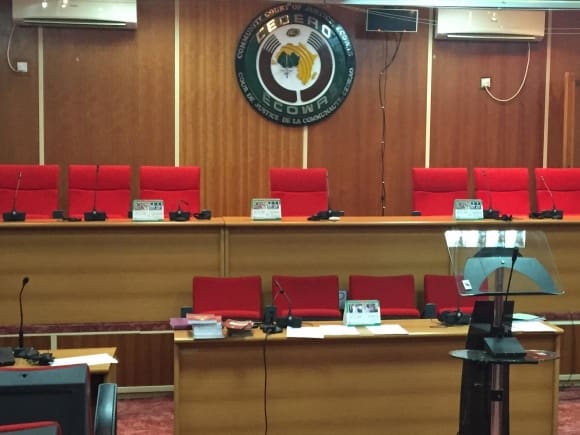Oral arguments were heard on 11 October 2016, at the ECOWAS Community Court of Justice sitting in Abuja, in a case against the Gambia. The case, which is supported by the Media Legal Defence Initiative (MLDI), has been brought by the Federation of African Journalists (FAJ) and four individual Gambian journalists currently living in exile.
The Court has been presented with accounts given by journalists who have been arrested, held in secret detention and tortured in the Gambia under draconian press laws providing for sedition, criminal libel and false news.
Journalists in the Gambia currently operate in a climate of fear, particularly in light of a recent history of journalists being detained, tortured, disappeared and murdered for simply carrying out their work. This widespread crackdown on independent journalism has resulted in over 110 journalists fleeing the Gambia since President Jammeh came to power in 1994.
The case before the ECOWAS Court considers the oppressive tactics adopted by the Gambian authorities to suppress independent journalism in the country.
The Court will rule on whether the draconian press laws providing for sedition, criminal libel and false news comply with the Gambia’s human rights obligations under international law and whether the measures adopted by the Gambia in enforcing these laws have violated the rights of journalists, including the right to freedom from torture.
Noah Ajare, the lawyer representing the Applicants, told the Court that a positive judgment “would recognise the absolute failure of the Gambian authorities to protect journalists in the performance of their important democratic function as “public watchdogs”, and would be further acknowledgement that the laws on sedition, criminal defamation and false news need to change before exiled journalists can safely return to their home country to fully carry out this function.”
Padraig Hughes, MLDI’s Legal Director, who was present at the hearing, said: “We are glad to have been given the opportunity to put this important case before the ECOWAS Court. The Court is already too familiar with the Gambia’s appalling track record on press freedom. This case presents the Court with the opportunity to build on its previous case law, by challenging the very laws that the Gambia uses to prevent free speech.”
Abdulwaheed Odusile, President of FAJ, said: “This case is significant for our members in The Gambia, who practice journalism under the constant threat of detention, beatings, torture and forced exile. For too long the Gambia has acted with impunity towards journalists. For too long this has been the reality for our members in that country. It needs to change.”
The Court has reserved judgment on admissibility and merits and will deliver its judgment at a later date.
Recent News
Landmark Ruling: Kenya’s High Court Declares Colonial-era Subversion Laws Unconstitutional
Media Defence welcomes the verdict of the High Court in Nakuru, striking down sections of the Kenyan Penal Code which criminalise subversion, citing them as relics of colonial oppression that curtail freedom of expression. Justice Samwel Mohochi, delivering the judgment, asserted that these provisions were overly broad and vague, stifling dissent rather than serving any […]
UN Rapporteurs Call for Protection of Brazilian Journalist Schirlei Alves
UN Rapporteurs Call for Protection of Brazilian Journalist Schirlei Alves Amid Defamation Charges Stemming from Rape Trial Coverage A letter dispatched by UN rapporteurs to the Brazilian Government calls for protective measures for women journalists covering cases of sexual crimes. The letter also denounces the conviction of Brazilian investigative journalist and women’s rights defender, Schirlei […]
Convite à apresentação de candidaturas: Cirurgia de litígio em português na África Subsariana
Cirurgia de litígio em português na África Subsariana Aplique aqui 23 a 25 de julho de 2024 em Nairobi, Quénia Prazo: 3 de maio A Media Defence está a convidar advogados sediados na África Subsariana que falem português a candidatarem-se a participar numa próxima cirurgia de litígio sobre o direito à liberdade de expressão e […]



